| | | | | | | Presented By Equinor | | | | Axios World | | By Dave Lawler ·Oct 11, 2021 | | Welcome back to Axios World. - We're starting tonight (1,831 words, 7 minutes) with the path forward on the pandemic, checking out some wild political twists from central Europe, making a stop in Syria, and then planning our next trip.
New arrival? Subscribe | | | | | | 1 big thing: What "beating" COVID-19 looks like |  | | | Lining up for a nightclub in Copenhagen. Photo: Olafur Steinar Gestsson/Ritzau Scanpix/AFP via Getty | | | | After 18 months of wondering when this will all be over, it's increasingly clear that there will never be a moment of victory for vaccines against variants or humanity against the virus. The big picture: Case counts remain stubbornly high even where just about everyone who wants a shot has had one. Countries like Australia and New Zealand that had sought to keep out COVID-19 altogether are now learning to live with the virus. - The world map is a checkerboard of varying pandemic restrictions, border policies and case counts. The daily global tallies of cases and deaths are around where they were one year ago.
- The question: What would finally "beating" COVID-19 actually look like?
According to Jeremy Farrar, a leading authority on infectious diseases and director of the Wellcome Trust, it looks like Denmark. - The government there has lifted all restrictions, thanks primarily to a high vaccination rate (76% of the population and 87% of over-12s). The virus is still spreading, one to two Danes are dying each day on average, but serious cases are relatively rare.
- "This virus will be here, I think, forever," Farrar says. "We won't get to zero deaths."
- But with near-universal vaccination, natural immunity, and better testing and treatments (as well as ready access to booster shots and second-generation vaccines down the line), wealthy countries can reach a point where the danger is limited.
The flipside: With a lower vaccination rate and high levels of migration, the U.S. will have "a bumpier course," Farrar says. - Then there are countries like India, which has given one dose to nearly half its population but has 700 million people still to go — not to mention Afghanistan or the Democratic Republic of the Congo, where hardly anyone has had a first shot.
- Australia, New Zealand and some Southeast Asian countries that have never had major outbreaks also face "a bumpy exit" because they have little natural immunity and thus "their only way of exiting is really close to 100% vaccination."
Looming over all of this is the threat from variants. - "If you wanted to conduct an experiment of how to encourage this virus to go down a variant pathway, it would be to have ... some countries with very high vaccine uptake, some with very low, some countries with a lot of natural immunity, some countries with little natural immunity," Farrar says.
- "We're giving an evolutionary advantage to this virus, which I hope it doesn't exploit."
Farrar, who serves on the scientific body that advises the U.K. government, thinks countries like his should therefore offer a third dose to those who are immunosuppressed or otherwise particularly vulnerable, but otherwise opt for the "benevolent self-interest" of sharing doses globally. - The vaccines are still serving their main purpose of preventing hospitalizations and deaths, he contends, but "the domestic pressures, driven in some degree by fear, would be to vaccinate all of us a third time, a fourth time, a fifth time."
- Farrar likens the booster dilemma to debates on climate action.
The bottom line: Farrar envisions a future in which, as with car accidents, COVID-19 will be an unfortunate fact of life. - It won't be possible to eliminate deaths, but it will be possible to limit them, "and that will be a trade-off that society comes to accept."
- Denmark seems to have reached that point. The rest of the world has a way to go.
|     | | | | | | 2. Interview: Farrar on the lab leak theory | 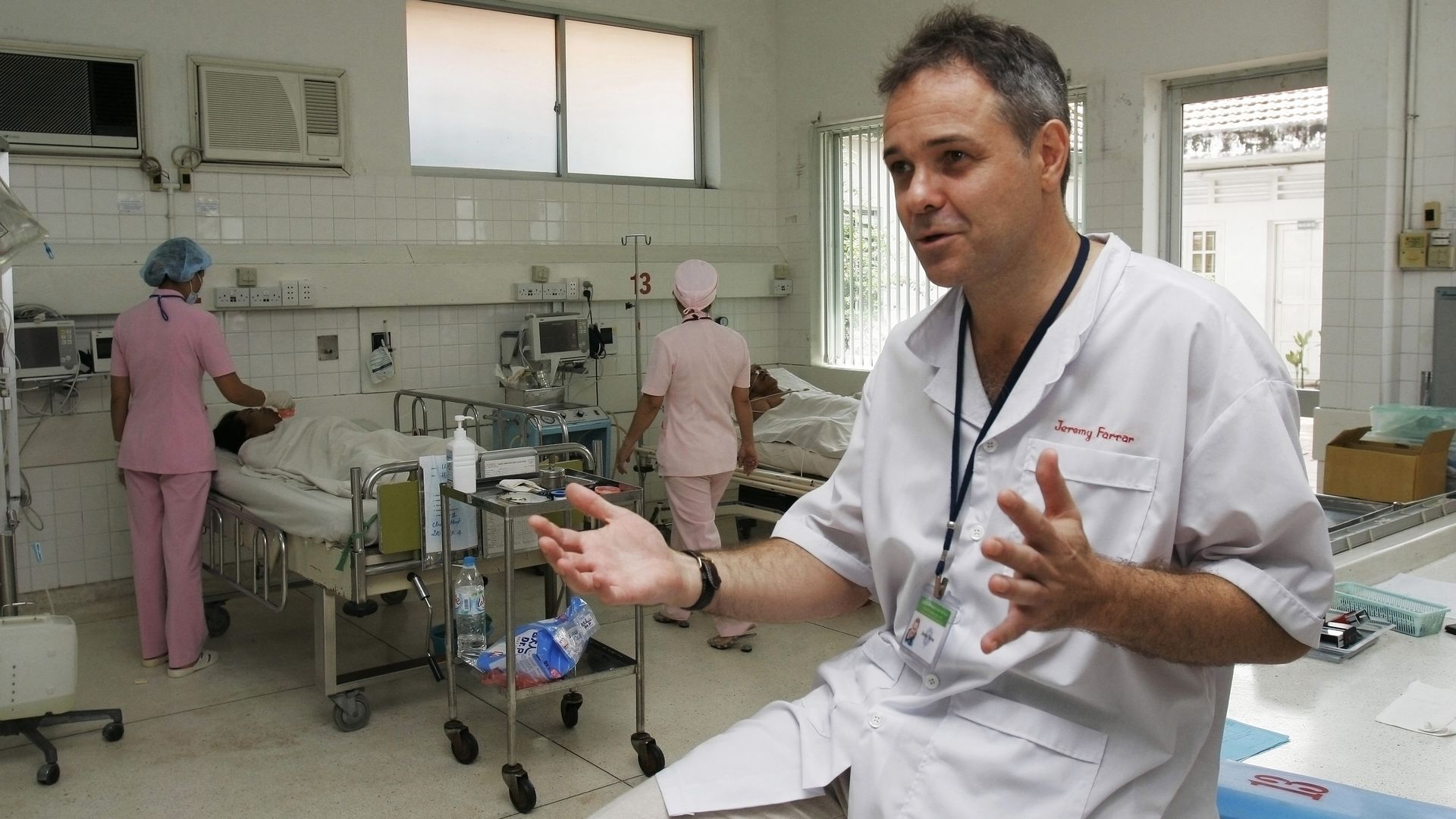 | | | Farrar in Vietnam during the 2006 bird flu crisis. Photo: Chau Doan/LightRocket via Getty | | | | Farrar, who specializes in emerging diseases, was one of the first people in the world to study the novel coronavirus and warn of a potential pandemic. He immediately suspected a lab leak. "When I first heard about it, you know, the Wuhan laboratories are well-known — that was my first thought," he says. - He discussed that possibility with NIAID director Anthony Fauci, among others, in early 2020. The origins question was so explosive that Farrar purchased a burner phone on the advice of a former head of Britain's MI5 spy agency.
- But after studying the virus genome and considering past outbreaks, he now believes with 95% confidence that the virus spread to humans from animals.
- "But you cannot rule out an accident, and it's a tragedy in many ways that geopolitics has intervened and China has not been willing to open the lab, and perhaps geopolitically we have not handled it as well as we could or should have done."
|     | | | | | | 3. Busy weekend in central Europe |  | | | Kurz steps down. Photo: George Hochmuth/APA/AFP via Getty | | | | Axios fellow Fabienne Kinzelmann has the latest from Austria, the Czech Republic and Poland: 1. Sebastian Kurz resigned as Austria's chancellor on Saturday and was replaced today by his former foreign minister, Alexander Schallenberg. Driving the news: Anti-corruption prosecutors are investigating Kurz and nine others on suspicion of breach of trust, bribery and corruption amid a scandal that involves manipulated opinion polls and shady taxpayer-funded studies. - Kurz was the wunderkind of European conservatives after taking power at 31, but his first government collapsed after just 1.5 years due to a scandal involving his far-right coalition partners. At 35, he's out of power for a second time.
- Yes, but: He remains popular, he's still the leader of the ruling conservative People's Party, and he could well be back before long.
2. The Czech Republic's populist prime minister, Andrej Babis, unexpectedly lost Saturday's election. The backdrop: On the eve of the vote, Babis was ensnared in "Pandora Papers" allegations that he purchased real estate in France in 2009 through foreign shell companies. - What to watch: President Milos Zeman, a Babis supporter, said before the election that he'd give the leader of the largest party the first shot to form a government. That would be Babis, but he has no path to a majority if two opposition alliances follow through on their promise to rule together.
- Worth noting: Zeman is currently in intensive care due to long-standing health issues.
3. Several thousand Poles took to the streets on Sunday to protest a Constitutional Court ruling that some fear could jeopardize Poland's place in the European Union. Why it matters: The ruling gave national law precedence over EU law, escalating a conflict between Brussels and Warsaw over the alleged politicization of Poland's courts under the ruling Law and Justice Party. - "Polexit" is now a hotly debated topic, but a recent survey found that 88% of Poles view EU membership positively.
- What to watch: The European Court of Justice today began oral arguments on lawsuits filed by Poland and Hungary against a new EU mechanism that would tie EU funding to the rule of law. Both countries stand to lose billions in coronavirus aid.
|     | | | | | | A message from Equinor | | How Equinor is becoming a leader in America's offshore wind industry | | | 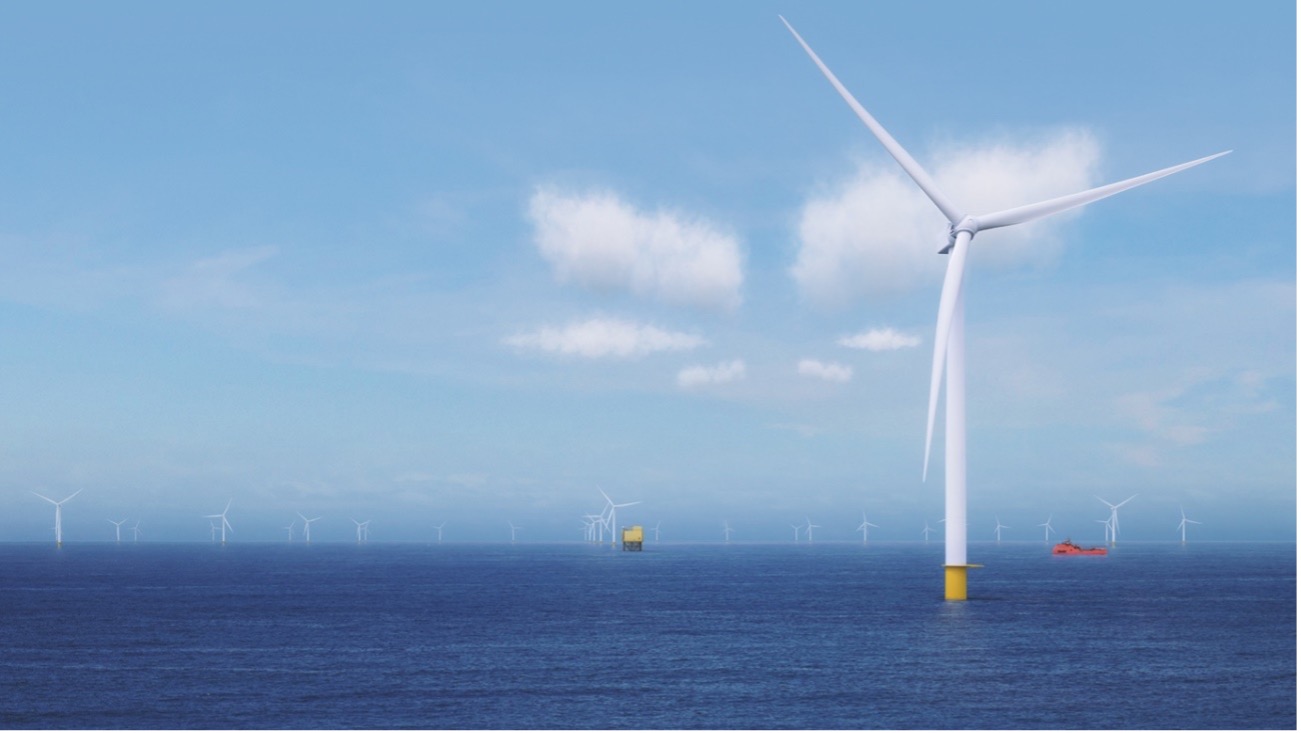 | | | | Equinor plans to power 2,000,000 homes in New York with homegrown, renewable energy — that will also boost the economy and generate jobs. With a net-zero target for 2050, Equinor is pursuing the development of the Empire Wind and Beacon Wind offshore wind projects in the U.S. | | | | | | 4. Assad comes in from the cold | 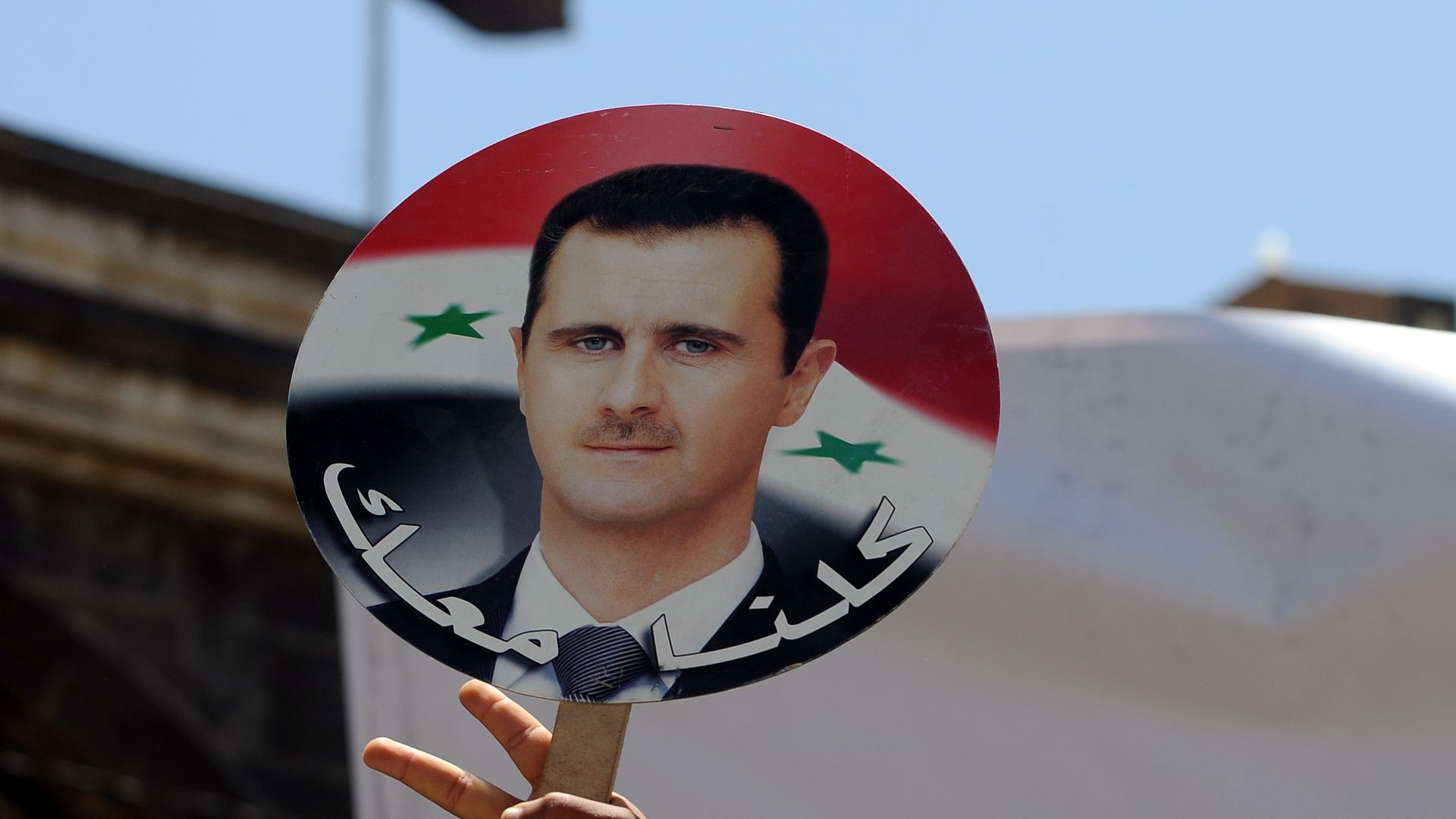 | | | Photo: Mohammed Hamoud/Getty Images | | | | A decade after the Arab League voted to suspend Syria at the onset of a brutal civil war, President Bashar al-Assad is being welcomed back in from the cold by some of America's closest regional allies, Axios' Zach Basu writes. Driving the news: Jordan's King Abdullah II, the first Arab leader to call for Assad to resign in 2011, spoke to the Syrian dictator last week for the first time since the conflict broke out, and he recently reopened the two countries' main border crossing to help boost trade. - Egypt's foreign minister met his Syrian counterpart at the UN General Assembly last month and vowed to help "restore Syria's position in the Arab world."
- And the United Arab Emirates announced Sunday that it had agreed to deepen economic cooperation with Syria.
- Flashback: All three countries supported Western-backed rebels against Assad in the civil war, which Assad has now largely won thanks to Russian and Iranian interventions.
The big picture: Hopes for regime change are long gone, the U.S. isn't focused on Syria, and regional actors feel they must step into the vacuum to protect their own interests, says Charles Lister, director of the Middle East Institute's Syria program. - Those include economic necessities, a desire to counter regional rivals like Iran and Turkey, and a practical embrace of Assad as "the devil they know."
- Between the lines: "The fact that we're seeing this rhetoric coming out so publicly in the open would seem to suggest to me there does appear to be a kind of tacit acceptance by the Biden administration that it is OK for the region to re-engage," Lister says.
Go deeper |     | | | | | | Bonus: Where in the world | 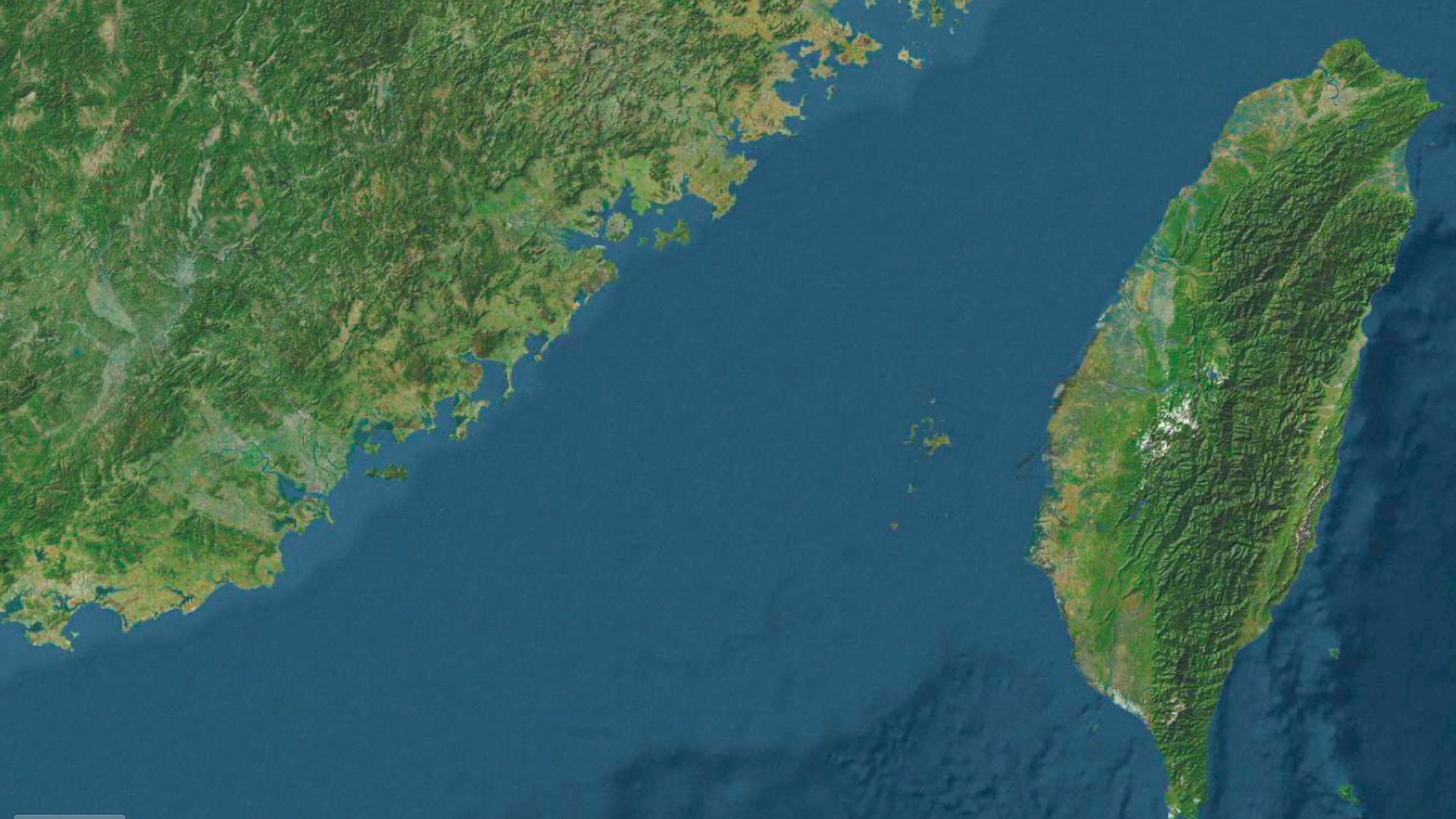 | | | Screengrab via Apple Maps | | | | Today we're navigating a waterway of immense geopolitical importance. Can you name it? Bonus: What is the strait's width at its narrowest point? - A) 18 miles
- B) 81 miles
- C) 181 miles
- D) 811 miles
Scroll to the bottom for the answer. |     | | | | | | 5. Global news roundup | 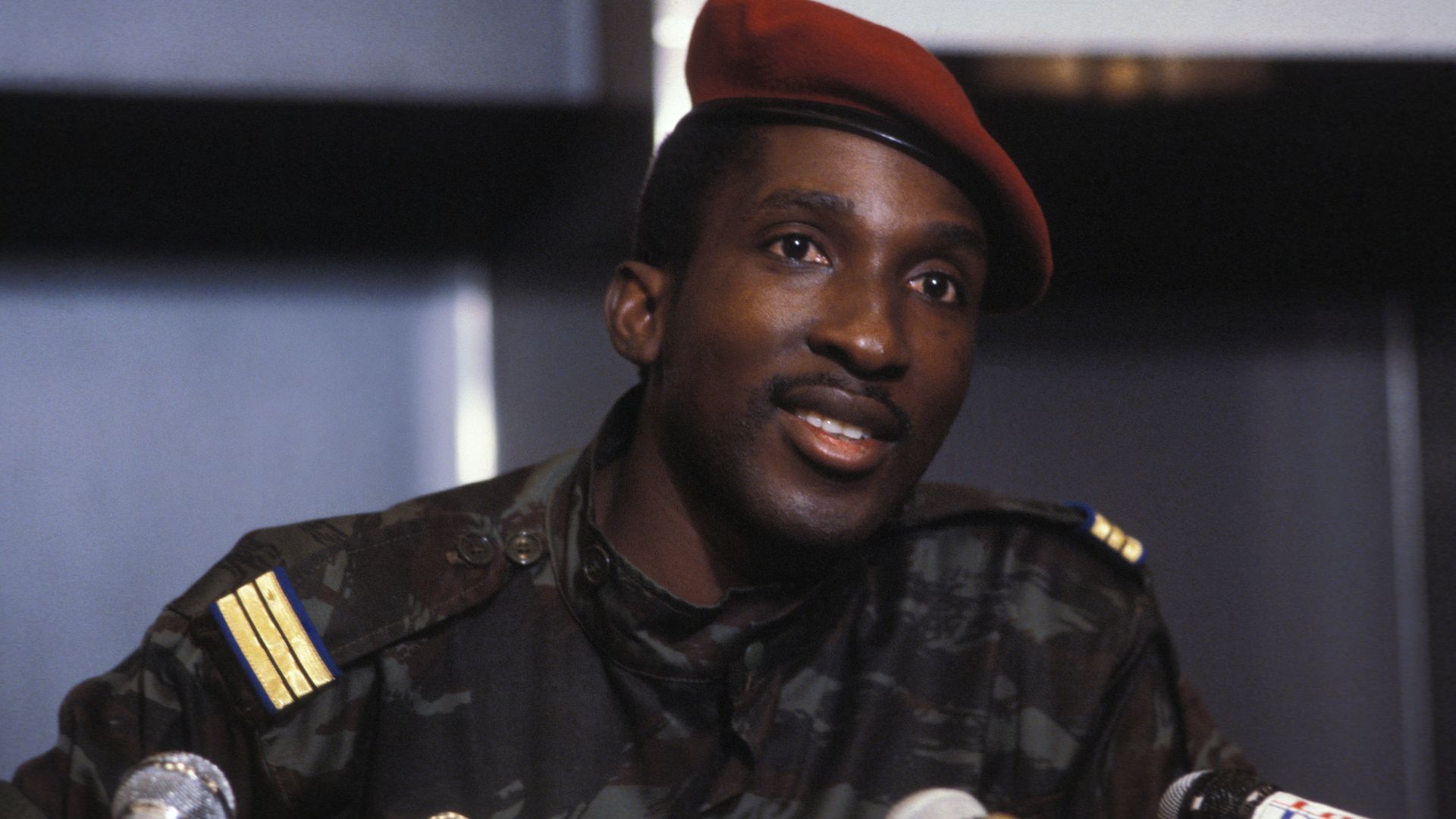 | | | Thomas Sankara in 1983. Photo: Alain Mingam/Gamma-Rapho via Getty | | | | 1. The IMF and World Bank are holding their annual meetings this week. - All eyes will be on IMF chief Kristalina Georgieva's fight to keep her job amid allegations that she intervened to help boost China's rating in the much-maligned "Ease of Doing Business" index in 2018 while at the World Bank (which was seeking to raise money at the time, including from China). She denies the accusations.
- What to watch: The IMF is expected to slightly lower its growth estimates for this year due largely to a lack of vaccines in developing countries.
2. The U.S. held high-level direct talks with the Taliban over the weekend for the first time since the fall of Kabul. - Taliban leaders say the U.S. agreed to provide humanitarian aid but will not recognize their government. They've also said they won't work with the U.S. to combat groups like ISIS-K.
- What to watch: With a humanitarian crisis looming, what will happen to the $10 billion in Afghan assets that the U.S. has frozen?
3. Initial results show cleric Muqtada al-Sadr's party winning the most seats in Iraq's parliamentary elections on Sunday amid record-low turnout. 4. Fourteen men, including a former president, went on trial today in Burkina Faso for the 1987 assassination of Thomas Sankara, a revolutionary leader who is sometimes compared to Che Guevara. 5. A Navy nuclear engineer and his wife were arrested in West Virginia on Saturday after making several attempts to pass along secrets about U.S. nuclear submarines to a foreign country, Axios' Ivana Saric writes. 6. Abdul Qadeer Khan, the father of Pakistan's nuclear bomb who later shared nuclear secrets with Iran, Libya and North Korea, has died. |     | | | | | | 6. Comparing vaccinations in travel destinations |  Data: Our World in Data; Chart: Jared Whalen/Axios. Data shows % with at least one shot. International travel from the U.S. is still 56% below pre-pandemic levels, but travel to Mexico and the Dominican Republic — easily the two top destinations — has actually surged past where it was in 2019, Axios' Joann Muller writes. - In case you're planning some international travel, here's a look at the vaccination rates in the top (pre-pandemic) destinations for American travelers.
- Worth noting: Some of these countries, such as Australia, are still off-limits to American tourists.
|     | | | | | | 7. Stories we're watching |  | | | An autumn day in Riga, Latvia. Photo: Abdulhamid Hosbas/Anadolu Agency via Getty | | | - 130+ countries agree to deal on global corporate tax rate
- Journalists Ressa and Muratov win Nobel Peace Prize
- Beijing-Taiwan rhetoric heats up
- Ethiopian troops launch major Tigray offensive
- Police arrest Indian minister's son over protest killings
- Pfizer to vaccinate entire Brazilian city as part of study
- Troops remain unvaccinated as deadlines near
Quoted: "President Sassou reserves the right to prosecute anyone who reiterates these accusations without providing any supporting evidence." — A government spokesperson's response to Pandora Papers reports that the Republic of Congo's longtime leader secretly owned a company that controls valuable diamond mines. |     | | | | | | A message from Equinor | | The energy transition is the defining opportunity of our time | | |  | | | | Equinor is helping create affordable, reliable and accessible energy by: - Accelerating the energy transition through the Empire Wind and Beacon Wind offshore wind developments.
- Planning to power 2,000,000 homes in New York with homegrown, renewable energy.
And more. Get the details. | | | | Answers: Taiwan Strait; B. |  | | It'll help you deliver employee communications more effectively. | | | | | | Axios thanks our partners for supporting our newsletters. If you're interested in advertising, learn more here.
Sponsorship has no influence on editorial content. Axios, 3100 Clarendon Blvd, Suite 1300, Arlington VA 22201 | | | You received this email because you signed up for newsletters from Axios.
Change your preferences or unsubscribe here. | | | Was this email forwarded to you?
Sign up now to get Axios in your inbox. | | | | Follow Axios on social media:    | | | | | |












No comments:
Post a Comment